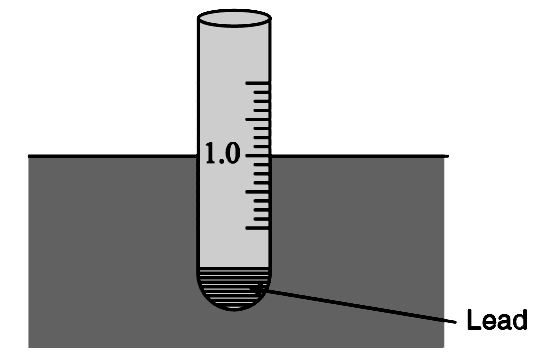A hydrometer stem has a length 30 cm. If the hydrometer is immersed in water , its floatation bulb just sinks. If the same hydrometer is immersed in a liquid having density of 500kgm−3, two-third of the stem is immersed. Find the least specific gravity of a liquid that can be measured using the hydrometer.
Let 'V' be volume of the hydrometer upto the beginning of its stem (i.e., volume of gravity bulb + floatation bulb)
Let 'a' be the area of cross section of the stem. When the hydrometer is immersed in water, V×1 = mass of hydrometer.
Density of the given liquid = 500 kg m−3=0.5 g cm−3
Length of the stem immersed in the liquid
=23 (totat length) =23×30=20cm
∴ volume of the hydrometer in the liquid = V+20a
∴ mass of liquid displaced= (V+20a)0.5
= mass of hydrometer
∴(V+20a)0.5=V
⇒V+20a=2Vora=V20
Let 'p' be density of the liquid on which the hydrometer floats upto its full length of stem, then mass of hydrometer =(V+30a)p=V
⇒p=VV+30(V20)⇒p=0.4
∴ least specific gravity of the liquid that can be measured using the hydrometer is 0.4.
Topper's Solved these Questions
Similar Questions
A hydrometer stem has a length 30 cm. If the hydrometer is immersed in water , its floatation bulb just sinks. If the same hydrometer is immersed in a liquid having density of 500kgm−3, two-third of the stem is immersed. Find the least specific gravity of a liquid that can be measured using the hydrometer.
View SolutionA hydrometer stem has a length 30 cm. If the hydrometer is immersed in water , its floatation bulb just sinks. If the same hydrometer is immersed in a liquid having density of 500kgm−3, two-third of the stem is immersed. Find the least specific gravity of a liquid that can be measured using the hydrometer.
View Solution
Knowledge Check
A body P floats in water with half its volume immersed. Another body Q floats in a liquid of density 34th of the density of water with two - third of the volume immersed. The ratio of density of P to that of Q is
A1:2B1:1C2:3D3:4
A variable immersion hydrometer is used to measure the specific gravity of two liquids When the hydrometer reads 0.8, half of the total length of the hydrometer stem is immersed in the liquid and when the hydrometer reads 0.6,3/4 th of the total length of the hydrometer stem is immersed in the liquid. What is the maximum and minimum reading that can be measured by using this hydrometer ?
View SolutionThe depth of immersion of hydrometer in water is 10 cm. What will be the depth of immersion in a liquid whose density is 2gcm−3?
View SolutionThe depth of immersion of hydrometer in water is 10 cm. What will be the depth of immersion in a liquid whose density is 2gcm−3?
View SolutionA metal cube of 5cm side and relative density 9 is suspended by thread so as to be dompletely immersed in a liquid of density 1.2×103kgm−3. Find the tension in the thread.
View Solutionthe stem of a hydrometer is diveided into 100 equal parts. It reads 0 in water and 100 in a liquid of reative density 0.8 . Find the realtive denstiy of the liquid in which it reads 50.
View Solutionthe stem of a common hydrometer is divided into 100 equal parts. It reads 0 in water and 100 ina liquid of relative density 0.8. find the relative density of the liquid in which it reads 50 .
View SolutionA device used to measure the specific gravity of a liquid is called a hydrogmeter. In a simple hydrometer there is a cylindrical galss tube with some lead-weight at its bottom. The device floats in liquid while remaining vertical. The top part of the tube extends above the liquid and the divisions marked on the tube allows one to directly read the specific gravity of the liquid.

The scale on the tube is calibrated such that in pure water it reads 1.0 at the water surface and a lenght z0 of the tube is submerged. calculate the specific gravity of the liquid if the liquid level is ΔZ above the 1.0 mark. Disregard the curvature of the tube bottom.
View Solution